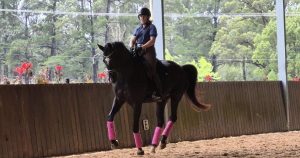BY KARRI NADAZDY, HORSE & LIVESTOCK REPRESENTATIVE, ANIMAL CARE AUSTRALIA
Feeding horses over the fence might seem like a harmless and friendly gesture, there are several reasons why it’s best to avoid doing so:
1. It Can Be Deadly: Some foods can be toxic for horses, and have serious consequences. The horse may not become sick for some hours after you have fed it, and the owner will not know what has happened to inform the vet. Some horses have food intolerances and allergies too, and the owner will not why their management is not working.
2. Diets: Many horse owners carefully manage their horses’ diets. They might have restricted or special feeds for specific health conditions, be monitoring calorie intake to increase or reduce weight, or be on a strict diet to resolve a vitamin or mineral imbalance. Unplanned treats can disrupt this careful balance.
3. Sudden Dietary Changes: Any dietary changes for horses should be made very gradually over a week or more to prevent serious, and sometimes sudden health issues. Horses have a symbiotic relationship with the good bacteria in their digestive system to help them digest starchy foods, and it’s the bacteria that cannot handle sudden changes.
Things like fresh lawn clippings ferment in the horse’s stomach, killing the helpful microbiome that the horse depends on. Without healthy bacteria, horses can suffer painful colic. As horses are unable to vomit, colic can be fatal, even with the best veterinary treatment.
4. It’s not safe for the Horse: Horse owners try to minimize their horse’s contact with perimeter fencing. This is especially true if its barbed wire or another structure that could injure the horse. So it is not helpful to encourage horses to approach, touch, lean on or against fences, as those fences will eventually give way. The fences are there to keep the horse safely contained and off roads and out of other properties. This could result in unnecessary injury to the horse, along with a big vet bill. Damage to fencing because horses are trying to reach snacks they shouldn’t be having is very costly to the owner too.
5. It’s not safe for you: Horses can react unpredictably, especially if they’re startled, protective or fighting their friend to get the treats you are offering. It can also teach them to nip, bite or snatch at fingers – putting the owner or their children at risk too.
While the idea of feeding horses is heartwarming for you, and might make the horse happy in the short term, try to appreciate the owners’ care and responsibility for the horse and do not feed them over the fence. If you really can’t help yourself, ask the horse owner first to ensure you are not causing any harm.
It’s not enough to know what’s safe for most horses, each horse is an individual. Don’t be upset if the owner says no to snacks over the fence. They are just being a responsible horse owner! You can be a good friend to horses by admiring them from a respectful distance.
Animal Care Australia (ACA) is a national incorporated association established to consult with government in advocating for real animal welfare by those who keep, breed and care for animals. Our goal is to promote and encourage high standards in all interactions with the animals in our care.





